This post was most recently updated on November 26th, 2016
 This article is about the help that refugees need in the camp in Dunkirk. A camp that is under resourced and forgotten. 1000 people, including babies and children, are living in damp, cold wooden sheds. The infant feeding team need money and volunteers. Read on for details and a link to donate. Thank you.
This article is about the help that refugees need in the camp in Dunkirk. A camp that is under resourced and forgotten. 1000 people, including babies and children, are living in damp, cold wooden sheds. The infant feeding team need money and volunteers. Read on for details and a link to donate. Thank you.
Trigger warning: references to violence and loss.
If you’re like most people, you probably thought the refugee ‘problem’ in France had been sorted. The world’s media watched as the Calais ‘Jungle’ was dismantled and refugees shuffled onto buses. We shrugged and felt sad and went on with our day.
But you would be wrong if you thought everyone had been relocated to comfortable lodgings, safe from traffickers, sex traders, drug pushers and rapists. Many are still there, sleeping in the streets in Calais or eeking out an existance in the ‘official’ camp in Dunkirk.
I recently spent a day in this camp. I say ‘official’ in inverted commas because, to all intents and purposes, the only 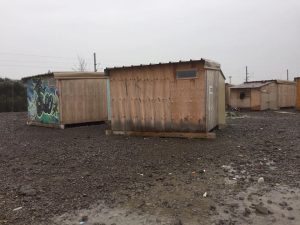 people running this place are volunteers, mostly pale and shellshocked young people, doing their best, with no experience. The camp in Dunkirk used to be like the Jungle; tents and hastily built shacks. It was slap bang next to a residential area, which attracted understandable protests from locals. So the Mayor found a field on the edge of town, threw in some garden sheds and a toilet block and asked the French Government to pay for it. A security firm now has a lucrative contract to ‘maintain’ the place. I didn’t see much maintenance being done, other than by volunteers. The security guards patrolled, telling us not to take photos. I’m not surprised they don’t want the world to see – the place is grim. And getting grimmer as the weather worsens.
people running this place are volunteers, mostly pale and shellshocked young people, doing their best, with no experience. The camp in Dunkirk used to be like the Jungle; tents and hastily built shacks. It was slap bang next to a residential area, which attracted understandable protests from locals. So the Mayor found a field on the edge of town, threw in some garden sheds and a toilet block and asked the French Government to pay for it. A security firm now has a lucrative contract to ‘maintain’ the place. I didn’t see much maintenance being done, other than by volunteers. The security guards patrolled, telling us not to take photos. I’m not surprised they don’t want the world to see – the place is grim. And getting grimmer as the weather worsens.
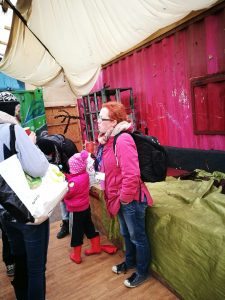
Lindsey talks to some volunteers
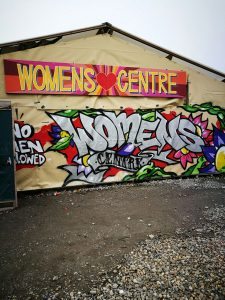 There is a Women’s Centre, a Children’s Centre, an Information Centre and a Community Kitchen, all built and run by volunteers. Most of these volunteers are English. The community spaces and the living quarters are wooden sheds, with no weather-proofing or insulation.
There is a Women’s Centre, a Children’s Centre, an Information Centre and a Community Kitchen, all built and run by volunteers. Most of these volunteers are English. The community spaces and the living quarters are wooden sheds, with no weather-proofing or insulation.
I visited because my good friend Lindsey Middlemiss runs the Infant Feeding Team. That sounds lovely and official and organised, but it is basically Lindsey, a trainee breastfeeding counsellor and doula, and whoever she can find to help (notably La Leche League Leader Katy Lockey in Folkstone, who kindly put us up on Friday night) trying to make sure that mothers with infants are being supported appropriately. We arrived this week because we knew that the volunteers running the Women’s Centre needed to learn some crucial stuff about feeding babies in emergency conditions. Well-meaning donations of powdered formula and bottles can cause illness and even death in young babies, so we desperately needed to teach them not to accept these donations and not to give them out to mothers*
We taught them to encourage more breastfeeding and to only give out liquid formula and feeding cups (which are easier to keep clean) if completely necessary.

Sophie in the women’s centre
I was accompanied by my friend Sophie Messager, doula and sling consultant. She was very popular with the women – the ground is stoney and very bumpy and many of them have nowhere to keep buggies dry, so slings are vital. She had a big bag of carriers to give away, and managed to teach a few women how to carry their babies.
The day we were there, the electricity in the Women’s Centre was out. It was bitterly cold, everywhere we went. My son helped out in the kitchen, scooping lentils out of an enormous sack. He was then deployed to help fix a rotten shed. None of the sheds are on concrete bases, so the damp is seeping up from
the ground and rotting the wood. When he returned, his fingers and face were blue
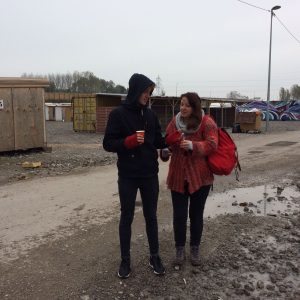
Mother and son take a moment to warm up
with cold; it was a brutal introduction to a world he’s been insulated against for all of his 16 short years.
I helped a mother whose child is biting her nipple; chewing on her all night long. She showed, me, a complete stranger, her nipples after speaking for less than 2 minutes. Her pain and desperation were palpable so I wasn’t surprised when I saw her shredded nipples. Almost everything I would say to a mother in this country I couldn’t say to this one: ‘keep a teething ring in the fridge’, ‘remember to sterilise it regularly’, ‘pop some teething gel on the baby’s gums at night’, ‘have dad give you a bit of a break by having babe in with him in a different room for a bit’ – all difficult or impossible suggestions for this environment. We did buy her some teething gel at the supermarket – but I couldn’t find her when I got back, so I hope the voluteer I gave it to manages to pass it on. I can’t stop thinking about the broken skin on her nipples and how much more difficult it is to keep clean in that place. I’m worried she’ll get mastitis – a bacterial infection of the breast that leads to fever and flu-like symptoms.
I sat with a little boy, desperate to learn the letters and numbers in English. He was about 8 years old and clearly very bright. The English Teacher in me bubbled easily to the surface and we had a fun game together for 10mins or so. The children are very friendly, having learned long ago to charm those who can help them. But the frustration and anger is very close to the surface and we saw many mothers struggling to control their child’s behaviour.

Where are the human rights? Just tell me where?
At the supermarket, the contrast between the stark, freezing, muddy place we had been in 5 minutes before and the conspicuous consumption of middle class French families shopping and eating hit us like a punch in the stomach. We had a shopping list for the Women’s Centre – nappies, UHT milk, liquid, ready-made up infant formula (MUCH safer than the powdered version). The centre needs a cold water sterilising system, so the mums can clean the baby’s dummies, feeding cups and chew toys. The centre also needs rugs on the floor, cushions, doormats and a place outside to take off shoes, so they can keep the place cleaner.
On the way back into camp, the main gate was blocked by police cars.
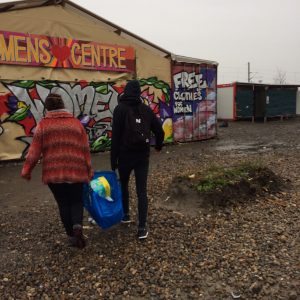
Nappies and other supplies for the mothers
Two Kurdish men were being arrested. There is a new wrist-band system that allows the residents to come and go. Spot checks by police identify those without wrist bands. Some of the time, people are arrested who have loaned their band to a newly arrived family so they can come into the camp. It is completely understandable that residents do this for homeless families who they meet outside. Smuggling them into camp prevents them sleeping in a ditch. So people are regularly risking arrest to do something kind. No one seems to know what happens to those who are arrested.
As one man was led past us, in handcuffs, by two cops, he looked at us and asked ‘English?’ and we nodded.
‘We are not animals’, he said.
It is at that moment I realised one reason why they want to come to Britain. The French have them living in appalling conditions and arrest them at the drop of a hat. The volunteers in camp, are mostly British, with the exception of the Medicin San Frontiers doctor and gynacologist. The French Government will not allow any charities or NGOs who are not French to operate in the camp.
This is not alright.
In fact it is scandalous that the French authorities are allowing the place to be pretty much run by inexperienced individuals, without the skills and knowledge that outfits like Save the Children or Unicef would bring. Why? I need someone to tell me why.
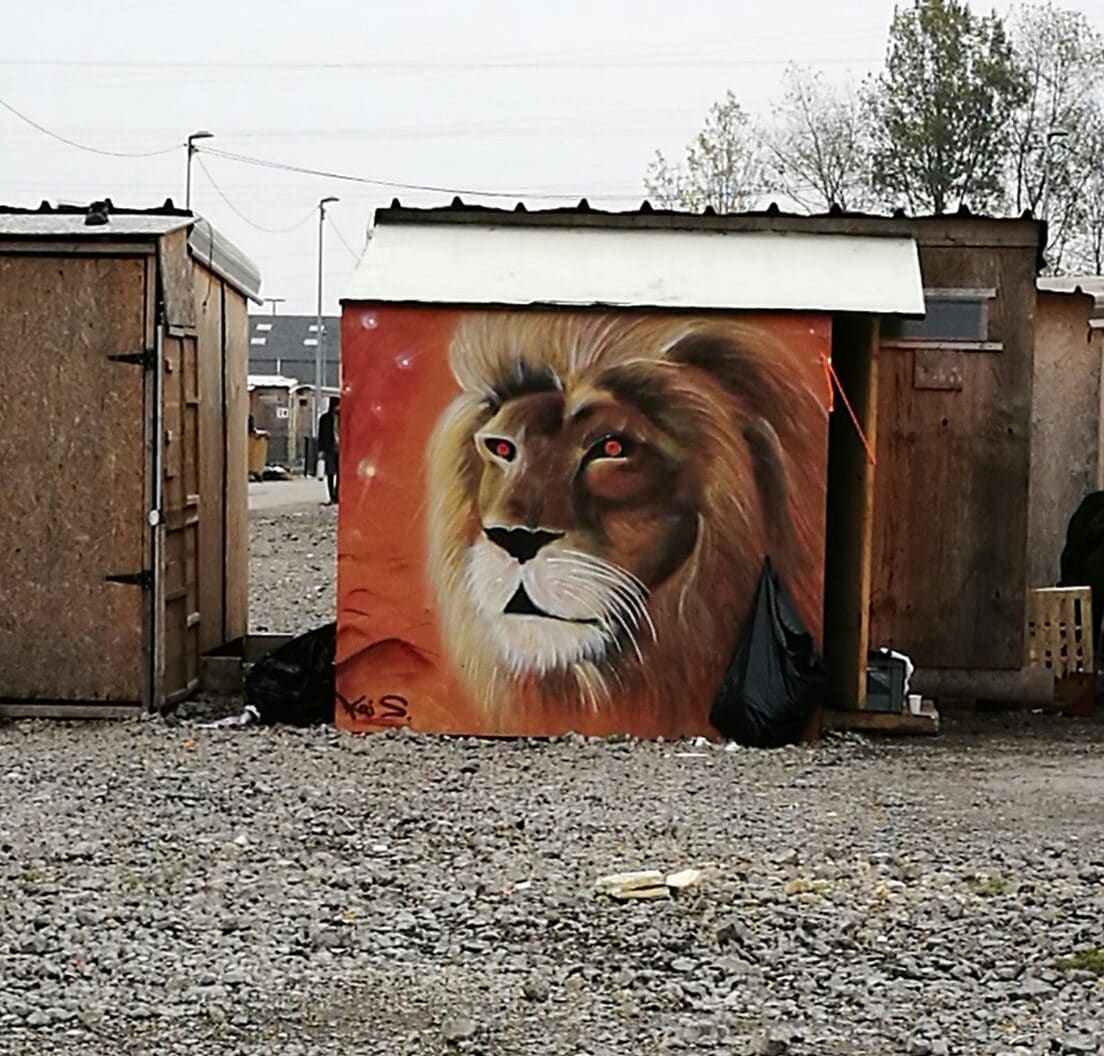
In the midst of it all, I see this beautiful painting on the wall of one of the huts and muse on what it means. The dignity and strength of the lion certainly seemed to be emblematic of the people I’d met that day.
We had realised that no daily needs assessment of the families with babies is being done at the moment. So, once back in camp, we asked for a list of which huts the babies are in and went and knocked on a few doors. One mother greeted us with a huge smile and invited us in immediately. Her family are Iraqi Kurds; 2 beautiful school-age children and a new baby of 8 weeks old. There was a sister or sister-in-law living with them too. So 3 adults, 2 children and a baby, living and sleeping in a space no bigger than your garden shed. There was one candle, a small calor gas heater, some blankets on the floor, a shelf, with a saucepan and some plates and cups. Everything was immaculately tidy.

swings for the kids
The baby was asleep in a bouncy chair, very close to the heater, covered in a thick blue blanket. We took off our shoes and sat on the floor and admired the baby. The mother’s English was minimal, but her female relative spoke quite fluently. We began to ask how things were going. The first thing she did was point to the tin of powdered formula on the shelf and ask for more. We asked if she was breastfeeding and found that yes, she was mostly feeding that way. So we gently explained the dangers of using powdered formula and bottles. With the help of some visual aids, like a knitted boob, a knitted nappy showing the colours of baby poo and the universal language of mime, we communicated some vital information and learned about her life.
The baby is crying a lot in the evenings – a conversation breastfeeding counsellors have with mothers every day. We explained why it is normal for babies to want to feed a lot at that time of day and that her breastmilk is creamiest in the evening. For most mothers this conversation would be enough, but how do you settle in for an evening cluster feeding session when you are in the street, with your family, looking for a lorry to sneak onto? The night before, they had found an open lorry but were discovered because the baby had cried.
 What could we say? Don’t do that? They are living in conditions that, if you kept your dog that way, the RSPCA would have something to say about it. We touched her arm and told her to be careful. What else could we do?
What could we say? Don’t do that? They are living in conditions that, if you kept your dog that way, the RSPCA would have something to say about it. We touched her arm and told her to be careful. What else could we do?
As the conversation was drawing to a close, there was a knock on the door. A volunteer passed in a new knife, presumanbly to replace a lost or broken one. The mother proudly took it out of it’s packaging and carefully placed it on a plate, together with some apples and satsumas and put it next to us on the floor.
‘Eat’, she said.
Our instinct was not to take the food out of the mouths of these people. We had eaten (a typically very good) meal in the supermarket at lunchtime. But her face said it all.
Please accept the little hospitality I can give you. Please allow me the luxury of treating you with the respect and graciousness I would have in my own country.
She did not need to be able to speak English to tell us that. Lindsey picked up a satsuma, peeled it and shared it with me. Humbled and hopeful we had helped her, just a little bit, we said goodbye.
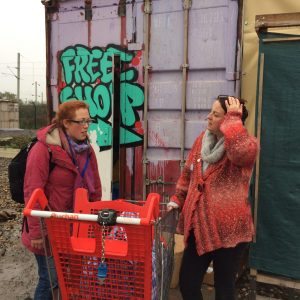
We confiscate the powdered formula
I don’t know what the answer is. I am not clever enough to have an opinion about the politics of this situation or the solutions for mass migration. All I know is that this camp is a blight on us; a shameful secret that does not reflect well on any of us Europeans. At the very least, whilst our leaders work out how best to deal with this crisis, these people need to be looked after with a modicum of dignity and respect.
By the time we left it was raining icy drops. The mud was getting muddier, the puddles bigger. The faces more drawn, ours included. I felt overwhelming love for these people – both the refugees and the volunteers, who are so young and so in need of
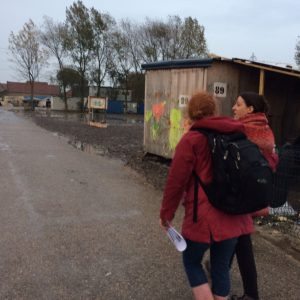
Back to the car after a long day
mothering through this experience. We hugged and left, promising to return, taking a trolley load of dangerous baby milk with us, hoping we had made a tiny difference.
Waking up in my comfortable bed the next morning, after a restless night, I wonder how we can allow this to be happening and why no one seems to know, or care. My overwhelming emotion is anger, the anger a mother feels when children are suffering.
*Powdered formula is not sterile and needs to be made up with piping hot water, then cooled to feeding temperature and used i
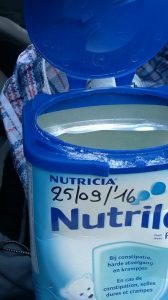
This formula had been open for weeks and kept in a damp, unclean environment
mmediately. The camp has very limited means of heating water, no ready access to washing up facilities and no sterilising equipment for bottles. In
these circumstances, a formula fed baby can be many hundreds of times more likely to die than a breastfed baby. Mothers who cannot breastfeed should be encouraged to use ready-to-feed liquid formula which has been pre-heat treated and is therefore much safer, and to feed with a cup, rather than a bottle, which can be a breeding ground for dangerous bacteria.
What can you do to help?
- Share this blog, and Sophie’s blog to raise awareness.
- The warehouse in Calais is run by really excellent volunteers who are pretty much on the case with food and clothing. The Infant Feeding Team need MONEY. We need to cover travel expenses and to be able to react to what we find when we are there and go buy whatever is needed. You can donate here.
- We need VOLUNTEERS. If you are a doula, a midwife, a health visitor, a nurse, a breastfeeding counsellor or peer supporter, you can do the readily accessible Infant Feeding in Emergencies online training and come along and help.
If you are a MAN, there are kitchen, maintenence and building jobs that need doing, now. - The Women’s Centre needs a long term volunteer – a strong mama with infant feeding knowledge who can mother the younger volunteers, instil boundaries and a homely atmosphere in the centre. If you are able to give some time, please contact Lindsey Middlemiss (lindseymiddlemiss @ hotmail.co.uk)
No one seems to know the future of this camp. There are rumours it is not being invested in because the authorities aim to close it. The fact is, there is extreme privation going on, right now, and these people need your help.

The huts are rotting, damp and freezing cold at night.
To find out more about the Women’s Centre, see their facebook page
Thanks to my son, Daniel, for some of these photos
Read my friend Sophie’s impressions of our visit here.
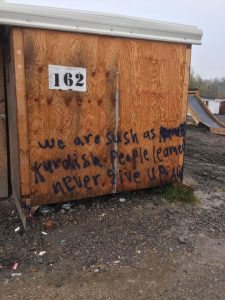
‘Kurds never give up’
Thank you Maddie for bringing out so much detail. I was there for two half days only as a volunteer. I wanted to do more and offered to. I was told the management (of the camp) is complicated. Also I hear a lot that the camp is being slowly emptied – not sure if that’s true. So much more could be done. I would like to try to go back. But thank you.